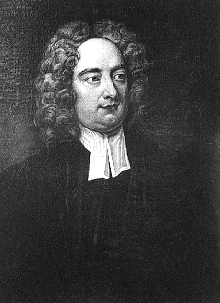| Profile | Major Works | Resources |
Jonathan Swift, 1667-1745

Famous Irish poet, pamphleteer, satirist and wit of Augustan Age.
Jonathan Swift was educated (more or less) at Trinity College, Dublin. In the aftermath of the 1689 Jacobite rebellion in Ireland, Swift found shelter in England, under the auspices of Sir William Temple, a prominent diplomat and statesman. Swift served as secretary to Temple for the next ten years. In the process, Swift earned his M.A. at Oxford, was ordained into the Episcopalian Church of Ireland. He was charged with the tutorship of Temple's young ward, Esther Johnson, a.k.a. "Stella".
After Temple died in 1699, Swift moved back to Ireland, working at various posts in the Church. In 1704, two satirical pieces -- Tale of the Tub and Battle of the Books -- earned him some renown (and some enemies). Returning to England intermittently, he became intimate with the Augustan wits and literary men of the day -- Addison, Steele, Pope and Congreve.
Although a long-time supporter of the Whigs, the growing chasm between Whigs and the established Church led Swift, in 1708, to launch a series of pamphlet attacks on the Whigs. By 1710, Swift had switched over the Tories completely and put his skills at their disposal. Swift took over The Examiner, a Tory rag, and, with a couple of 1711 pamphlets, helped turn to the tide of English public opinion against the "Whig" War of Spanish Succession.
With the death of Queen Anne in 1714, the Tories fell from favor and Swift returned to Ireland. He would serve as Dean of St. Patrick's Cathedral in Dublin for the rest of his life. He remained bitter but relatively quiet for several years.
In 1720, Swift roused himself from his perch and got busy again. His 1720 Irish Manufacture essay attacked English economic policy towards Ireland and suggested a boycott of English goods. The pamphlet was later declared seditious by the British government. His Swearer's Bank (1720) was his proposition for the setting up a bank to help small tradesmen in Ireland. His visceral series of 1724-5 pamphlets, known as Drapier's Letters led to the downfall of Wood's half-pence, the Whig government's plan to make up for the shortfall of coinage in Ireland by minting copper coins. His 1727 and 1728 pieces on the state of Ireland explains how British economic policies are keeping Ireland in a state of underdevelopment and poverty. This series of works on the state of the Irish economy culminated in the wickedly delicious A Modest Proposal (1729). His bitterness against British policy came out most fully in his Injured Lady (1746). Oh, incidentally, he also found time to write that masterpiece of satire, Gulliver's Travels (1726).
After the death of his beloved Stella, Swift began to drop off and gradually grew mentally unstable in the years before his death in 1745. Having served his role as an Irish patriot and Tory critic of Whig policies, Swift is duly celebrated in William Butler Yeats's poem "The Seven Sages" and in "Swift's Epitaph".
|
Major Works of Jonathan Swift
|
|
HET
|
|
Resources on Jonathan Swift
|
All rights reserved, Gonçalo L. Fonseca
